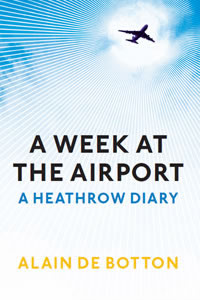Is the Job Interview Overrated?
Tags: board of directors, career transitions, Ebay, female executives, Hewlett-Packard, hiring, interviewing, James B. Stewart, Leo Apotheker, management, Meg Whitman, Michael Useem, msnbc.com, phone interviews, The New York Times, University of Pennsylvania
A Writer, His Workplace and Corporate Patron

For those who us who may be preoccupied with work (and with 9.6% unemployment who isn’t) and seek a broader understanding of our relationship to it, a recent book by Alain de Botton provides illumination.
Mr. de Botton, came to prominence over a decade ago, when he wrote How Proust Can Change Your Life and more recently considered The Joys and Sorrows at Work which met with mixed reviews. Now he continues his journey into how we work with A Week at the Airport (Vintage International 2010). (I learned about the Airport book from Gretchen Rubin’s insightful blog The Happiness Project.)
What is amazing about the book is its origins. It was instigated by Colin Matthews, the CEO of BAA, a subsidiary of Ferrovial that runs airports in England, Scotland and Italy including two outside London–Heathrow and Sansted.
Mr. Matthews, gives Mr. de Botton license to live at Heathrow Airport for a week, He takes up residence at the adjacent Sofitel Hotel and sets out to explore Terminal 5.
His title is writer-in-residence, one cannot imagine he would be any more prolific at a writer’s colony like Yaddo or Breadloaf. Mr.de Botton plunks himself down in the terminal and begins his interviews with travelers, security personnel, baggage handlers and even a corporate executive who seems to have less flexibility than those on the clock.
During one interview he meets Willie Walsh, the CEO of British Airways who is beset by threatened strikes, a balance sheet leaking red ink and the ire of Boeing, the aircraft manufacturer (He has fallen behind on a payment schedule for the 787 aircraft.)
What follows is an amusing portraity for any writer (myself included) who has attempted a CEO or celebrity interview and hoped for more than a tidbit to share with eager readers. “The promise of shared secrets is rarely fulfilled for it is almost never in the interests of a prominent figure to become intimate with members of the press. He has better people on whom to unburden himself. He does not need a new friend. He is not going to disclose plots of vengeance or his fears about his professional future.”
Alert to possibilities, Mr. de Botton floats the idea of becoming writer-in-flight, on a British Airways flight a concept that Mr. Walsh embraces slightly, before apologizing for taking so much of Mr. de Botton’s time and calling for a security guard to escort him from the corporate offices.
The relationship between Mr. Matthews, the BAA executive and Mr. Botton is a curious one, Chief executives have traditionally not been literary benefactors. Even after the publication of the book Mr. Botton puzzles over the motivation for it. In a reply to an e-mail inquiry he wrote, “… I’m stunned that Heathrow airport agreed to this book – indeed initiated it.” Previously, he said, “My experience of the corporate world for my previous book (The Pleasures and Sorrows…) was rather more negative. Again and again, I saw companies closing their doors to writers, assuming that they were either irrelevant or else out to destroy their reputations. The idea that a writer might simply want to observe and reflect in a complex way, both positive and sometimes negative, was alien to them.”
Mr. Matthews replied to a request about allowing a writer at Healthrow to chronicle activities there in human rather than strictly economic terms. He wrote in an e-mail,
“Alain de Botton’s book is not a traditional piece of corporate marketing. Opening Heathrow up to literary critique was an adventurous step and the result is a book that tempts people to think differently about Heathrow.
“We wanted a respected author and somebody who is passionate about travel to help us tell the many stories of passengers beginning or ending adventures at Heathrow, meeting or parting with people they love or just passing through on business.
“We can also tell a story of ongoing improvement in customer service at Heathrow. With freedom to roam the airport for a week and full editorial control of his book, Alain has created a credible story of how thousands of staff working across dozens of organisations are working hard to make every passenger’s journey better than the last one.”
With various models of new journalism being considered by pundits and journalists alike, Mr. Matthews observations offer an intriguing commentary about the role of the writer in our society. And as questions persist about why American corporations aren’t hiring, he offers an unconventional view about how to bring attention to a company’s products.
As the book concludes Mr. de Botton muses about all the other writer-in-residence positions he might take up in “institutions central to modern life—banks, nuclear power stations, governments, old people’s homes—and the kind of writing that could report on the world while still remaining irresponsible, subjective and a bit peculiar.”
Tags: Alain de Botton, Colin Matthews, corporate executives, corporations, Gretchen Rubin, hiring, interviewing, writer-in-residence

